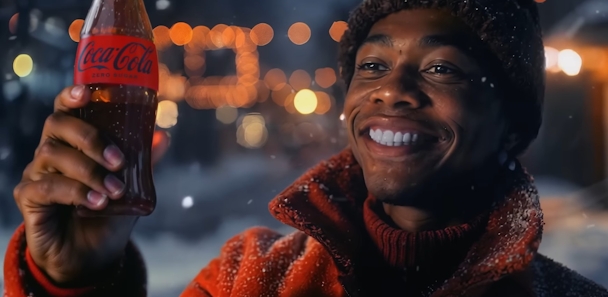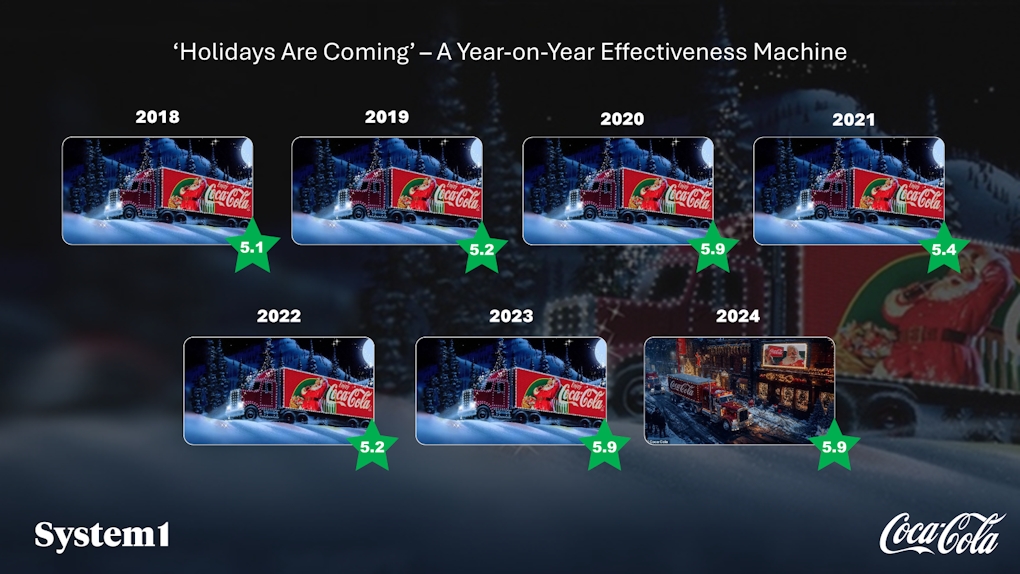I was wrong. People love Coca-Cola’s AI remake of a Christmas classic
When he first heard Coca-Cola remade its ‘Holidays are Coming’ campaign using AI, System1’s Andrew Tindall felt worried. After testing showed real people loved it, he learned its success was in long-term brand-building, not tech.

I must walk a fine line when sharing my opinion in my columns. After all, I work closely with a large number of brands, and shit-posting them will make my Monday morning meetings awkward.
But screw it. When Coca-Cola shared that it was replacing its classic Christmas truck spot with an AI version, it ruined my week. I’m not being dramatic. It genuinely clashed with everything I hold dear in marketing.
Consistency.
Brand history.
Great ads made by real people.
And it was a sign of the times and how much things are changing.
The main reason for my visceral reaction is what I wrote about in this column 12 months ago. The Coke Christmas truck ad has been used for 30 years and is effectiveness gold. It keeps scoring 5 Stars in System1 creative testing. It’s the Bastian of consistency, showing that repeating the same creative ideas, characters, and ads plays on our Familiarity Bias. People love the familiar, and they just keep loving this Coke truck ad every year.
Want to go deeper? Ask The Drum

It’s not just luck either; it’s strategically sound.
Consistent brands refresh the same memory structures again and again. It’s much easier to do this than create a new memory. This is why consistent brands get more salient, distinct and different. And ultimately grow more market share. In my new research with System1 and the IPA, Compound Creativity, there are plenty of killer charts proving this.
Everything I know points to this AI Christmas remake being a bad idea for effectiveness.
But.
Like many marketers, I needed to pull my head out of my ass. My obsession with strategy, advertising, and AI’s implications for our industry is as real as AI Santa Claus and his fingernail-free hands.
The judge of whether this works or not cannot be me or you. It needs to be Coca-Cola’s target customer.
So, System1 tested this with a large group of British Normos (non-marketers/consumers/cola-guzzlers/etc) with our creative measurement tool.
We measured the branded emotional reaction to the ad. The usual fare for us with one tiny difference.
We didn’t tell them they were watching an AI ad or that they were to compare it to the beloved original. That’s no doubt baggage you had when you clicked the headline to watch the ad the first time as an advertising practitioner of some sort.
So we predicted its creative effectiveness potential, and it scored top marks beating all previous Christmas truck ads over the years.
I was wrong.
Once again.
This ad, that gave me that visceral reaction, just secured effectiveness gold.
Its 5.9 Star Rating (out of six) predicts the ads’ ability to create future demand. It was hugely distinctive, with 98% of viewers knowing the ad was for Coke in 15 seconds. And all that heavy rapid distinctiveness mixed with strong emotional engagement gave it a top short-term score for its potential to convert in-market demand.
No one had any sort of negative reaction to it.
So, what does this mean for AI ads?
I don’t think this means that AI has ‘won.’ We don’t need to head to Soho’s Groucho Club and drink until the AI cows come home (although, maybe?). There’s some careful nuance here that we must acknowledge. [Editor’s note: Not sure about including this ‘nuance’ thing]
Advertisement
The ad has worked because, again, consistency is the greatest trick applied by world-class marketers. The less you change, the better. Coke has repeated this idea for literally 30 years, which has lowered processing fluency. Increasing cognitive ease. Humans don’t want to think, we are cognitive misers. Coke needs to do much less heavy lifting to land this idea in 2024. Fifteen seconds is enough; AI-generated imagery is enough. Heck, I think even the song alone might be enough.
Few brands can do this; few brands have built a campaign for 30 years.
Another reason this has worked is because generative AI has gotten much better. I’m kicking myself. Today, I posted about this ad and primed everyone that it’s an AI remake. Every marketer and their AI-generated girlfriend were in the comments saying they knew it was AI because the truck’s wheels don’t spin.
But I reckon if you aren’t primed, you wouldn’t think this is AI. Just look at the consumer testing data. They either haven’t noticed or don’t care. And AI is only getting better from here. I wonder if the results would be different if we told people it was made by AI first. I reckon we’d get some angry people, and the whole thing would fall apart very quickly.
And finally, it’s worked because this is a sprinkle of AI on top of years of the world’s best marketing. And this is my point. AI production is here. Everyone can now make an ad of this quality. It costs a fraction of the usual production costs. This levels the playing field—production budgets are no longer a competitive advantage.
This just makes marketing more important. Marketing strategy is the last strategic advance. Brand equity. Your in-market brand assets. Customer memory structures. Relative differentiation. Distinctiveness.
Some marketers will use this to churn out more ads that are less consistent, less distinct, and less emotional, eroding brand equity, pricing power and salience. Then, there will be trained marketers using this to execute their long-term strategy. Ads full of famous and unique brand assets, with characters and stories building decade-long positioning that will bring their brand to mind exactly when it needs to.
Coca-Cola has just proven AI really is here. Don’t grab your pitchforks and head to your nearest Tesla dealership. Grab your nearest copy of How Brands Grow and the Long and Short of It. It’s time to double down on our strategic marketing guns.
Let AI worry about tactics. Marketers need to be strategic powerhouses now more than ever.
Read more opinion on The Drum. More from Tindall on Effectiveness:
